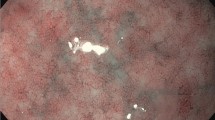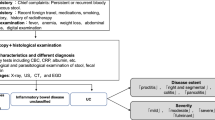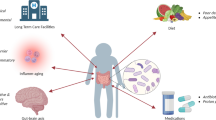Abstract
Background
Although vitamin D deficiency occurs in inflammatory bowel disease (IBD), it is currently unclear to what extent ethnicity affects vitamin D levels. Our aim was therefore to determine the ethnic variation in serum 25-hydroxyvitamin D status and its association with disease severity in adults with IBD.
Methods
We conducted a prospective cohort study in ambulatory care IBD patients. Clinical disease severity was assessed through validated questionnaires. Serum 25-hydroxyvitamin D levels were used for vitamin D status. C-reactive protein (CRP), ferritin and hemoglobin (Hgb) levels were correlated with serum 25-hydroxyvitamin D levels.
Results
Sixty ulcerative colitis (UC) and forty Crohn’s disease (CD) patients were enrolled comprising 65 % Caucasians and 29 % South Asians. However, South Asians had consistently lower average serum 25-hydroxyvitamin D levels (All 44.8 ± 18.1 nmol/L, UC 48.2 ± 18.3 nmol/L, CD 24.3 ± 13.3 nmol/L). Hypovitaminosis D was found in 39 % of All, 36.7 % of UC and 42.5 % of CD patients. A significantly higher proportion of South Asians were vitamin D deficient when compared to Caucasians in All and CD groups (58.6 % vs. 30.8 %, p = 0.01 and 85.7 % vs. 32.3 %, p < 0.01, respectively).
Conclusions
A significantly higher percentage of South Asians had hypovitaminosis D when compared to Caucasians. Disease severity trended towards an inverse relationship with vitamin D status in all South Asian and Caucasian CD patients, although most patients in this study had only mild to moderate disease. We suggest that vitamin D supplementation should be considered in all adult IBD patients.

Similar content being viewed by others
References
Xavier RJ, Podolsky DK. Unravelling the pathogenesis of inflammatory bowel disease. Nature. 2007;448:427–434.
Khor B, Gardet A, Xavier RJ. Genetics and pathogenesis of inflammatory bowel disease. Nature. 2011;474:307–317.
Holick MF. Vitamin D status: measurement, interpretation, and clinical application. Ann Epidemiol. 2009;19:73–78.
Hollis BW. Circulating 25-hydroxyvitamin D levels indicative of vitamin D sufficiency: implications for establishing a new effective dietary intake recommendation for vitamin D. J Nutr. 2005;135:317–322.
Holick MF. Vitamin D deficiency. N Engl J Med. 2007;357:266–281.
Liu PT, Stenger S, Li H, et al. Toll-like receptor triggering of a vitamin D-mediated human antimicrobial response. Science. 2006;311:1770–1773.
Lim WC, Hanauer SB, Li YC. Mechanisms of disease: vitamin D and inflammatory bowel disease. Nat Clin Pract Gastroenterol Hepatol. 2005;2:308–315.
Penna G, Adorini L. 1 Alpha,25-dihydroxyvitamin D3 inhibits differentiation, maturation, activation, and survival of dendritic cells leading to impaired alloreactive T cell activation. J Immunol. 2000;164:2405–2411.
Adorini L. Intervention in autoimmunity: the potential of vitamin D receptor agonists. Cell Immunol. 2005;233:115–124.
Kong J, Zhang Z, Musch MW, et al. Novel role of the vitamin D receptor in maintaining the integrity of the intestinal mucosal barrier. Am J Physiol. 2008;294:G208–G216.
Lagishetty V, Misharin AV, Liu NQ, et al. Vitamin D deficiency in mice impairs colonic antibacterial activity and predisposes to colitis. Endocrinology. 2010;151:2423–2432.
Froicu M, Zhu Y, Cantorna MT. Vitamin D receptor is required to control gastrointestinal immunity in IL-10 knockout mice. Immunology. 2006;117:310–318.
Froicu M, Cantorna MT. Vitamin D and the vitamin D receptor are critical for control of the innate immune response to colonic injury. BMC Immunol. 2007;8:5.
Cantorna MT, Munsick C, Bemiss C, Mahon BD. 1,25-dihydroxycholecalciferol prevents and ameliorates symptoms of experimental murine inflammatory bowel disease. J Nutr. 2000;130:2648–2652.
Lichtiger S, Present DH, Kornbluth A, et al. Cyclosporine in severe ulcerative colitis refractory to steroid therapy. N Engl J Med. 1994;330:1841–1845.
Harvey RF, Bradshaw JM. A simple index of Crohn’s-disease activity. Lancet. 1980;1:514.
Leslie WD, Miller N, Rogala L, Bernstein CN. Vitamin D status and bone density in recently diagnosed inflammatory bowel disease: the Manitoba IBD cohort study. Am J Gastroenterol. 2008;103:1451–1459.
Levin AD, Wadhera V, Leach ST, et al. Vitamin D deficiency in children with inflammatory bowel disease. Dig Dis Sci. 2011;56:830–836.
Vagianos K, Bector S, McConnell J, Bernstein CN. Nutrition assessment of patients with inflammatory bowel disease. JPEN J Parenter Enteral Nutr. 2007;31:311–319.
Siffledeen JS, Siminoski K, Steinhart H, Greenberg G, Fedorak RN. The frequency of vitamin D deficiency in adults with Crohn’s disease. Can J Gastroenterol. 2003;17:473–478.
Kuwabara A, Tanaka K, Tsugawa N, et al. High prevalence of vitamin K and D deficiency and decreased BMD in inflammatory bowel disease. Osteoporos Int. 2009;20:935–942.
Jahnsen J, Falch JA, Mowinckel P, Aadland E. Vitamin D status, parathyroid hormone and bone mineral density in patients with inflammatory bowel disease. Scand J Gastroenterol. 2002;37:192–199.
Joseph AJ, George B, Pulimood AB, Seshadri MS, Chacko A. 25 (OH) Vitamin D level in Crohn’s disease: association with sun exposure & disease activity. Indian J Med Res. 2009;130:133–137.
Sentongo TA, Semaeo EJ, Stettler N, Piccoli DA, Stallings VA, Zemel BS. Vitamin D status in children, adolescents, and young adults with Crohn disease. Am J Clin Nutr. 2002;76:1077–1081.
Pappa HM, Grand RJ, Gordon CM. Report on the vitamin D status of adult and pediatric patients with inflammatory bowel disease and its significance for bone health and disease. Inflamm Bowel Dis. 2006;12:1162–1174.
Lo CW, Paris PW, Clemens TL, Nolan J, Holick MF. Vitamin D absorption in healthy subjects and in patients with intestinal malabsorption syndromes. Am J Clin Nutr. 1985;42:644–649.
Vogelsang H, Schofl R, Tillinger W, Ferenci P, Gangl A. 25-Hydroxyvitamin D absorption in patients with Crohn’s disease and with pancreatic insufficiency. Wien Klin Wochenschr. 1997;109:678–682.
Tajika M, Matsuura A, Nakamura T, et al. Risk factors for vitamin D deficiency in patients with Crohn’s disease. J Gastroenterol. 2004;39:527–533.
Kruger MC, Schollum LM, Kuhn-Sherlock B, et al. The effect of fortified milk drink on vitamin D status and bone turnover in post-menopausal women from South East Asia. Bone. 2010;46:759–767.
Kuchuk NO, van Schoor NM, Pluijm SM, et al. Vitamin D status, parathyroid function, bone turnover, and BMD in post-menopausal women with osteoporosis: global perspective. J Bone Miner Res. 2009;24:693–701.
Green TJ, Skeaff CM, Rockell JEP, et al. Vitamin D status and its association with parathyroid hormone concentrations in women of child-bearing age living in Jakarta and Kuala Lumpur. Eur J Clin Nutr. 2008;62:373–378.
El-Matary W, Sikora S, Spady D. Bone mineral density, vitamin D, and disease activity in children newly diagnosed with inflammatory bowel disease. Dig Dis Sci. 2010;56:825–829.
Jørgensen SP, Agnholt J, Glerup H, et al. Clinical trial: vitamin D3 treatment in Crohn’s disease—a randomized double-blind placebo-controlled study. Aliment Pharmacol Ther. 2010;32:377–383.
Mangat BK, Evaschen C, Lee T, Yoshida EM, Salh B. Ethnic variation in the annual rates of adult inflammatory bowel disease in hospitalized patients in Vancouver, British Columbia. Can J Gastroenterol. 2011;25:73–77.
Acknowledgments
We thank Dr. Yoshida, Dr. Gray, and Dr. Byrne for their support and assistance in patient recruitment. We are grateful for Ms. Lisa Kuramoto’s guidance on statistical analysis. We appreciate the help from staff at the Division of Gastroenterology at Vancouver General Hospital.
Conflict of interest
None.
Author information
Authors and Affiliations
Corresponding author
Electronic supplementary material
Below is the link to the electronic supplementary material.
Rights and permissions
About this article
Cite this article
Fu, YT.N., Chatur, N., Cheong-Lee, C. et al. Hypovitaminosis D in Adults with Inflammatory Bowel Disease: Potential Role of Ethnicity. Dig Dis Sci 57, 2144–2148 (2012). https://doi.org/10.1007/s10620-012-2130-7
Received:
Accepted:
Published:
Issue Date:
DOI: https://doi.org/10.1007/s10620-012-2130-7




